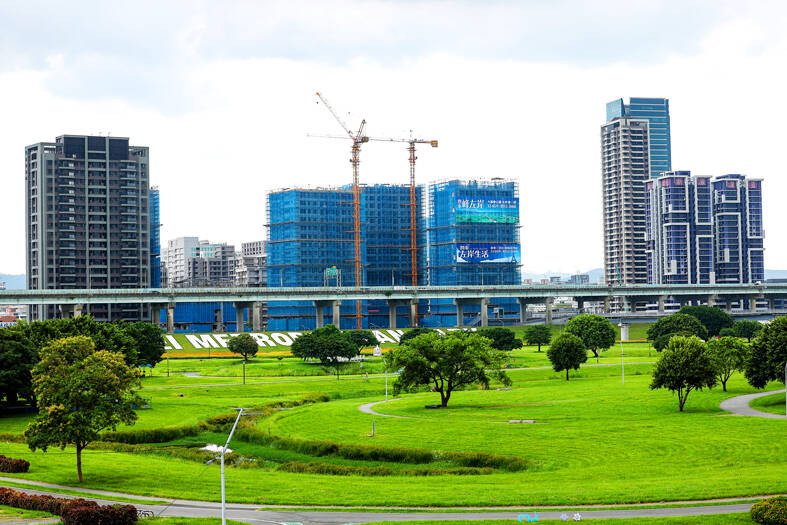Presale projects and new houses for sale in the coming fall sales season could exceed NT$200 billion (US$6.28 billion) in northern Taiwan, representing a 16.6 percent increase from the same time last year, as developers seek to cash in on preferential lending terms for first-home buyers, My Housing Monthly (住展雜誌) said yesterday.
The volume might hit NT$212.2 billion during this fall season, which would be the second highest in eight years, despite recent bans on transfers of presale house purchase agreements and an ongoing economic slowdown, it said.
The housing market has probably stabilized after digesting assorted unfavorable policy measures, the magazine’s research manager Chen Tsai-chi (成采錡) said.

Photo: CNA
Rather, the new preferential lending terms for first-home buyers, which keep interest rates on new mortgages at 1.775 percent, should be able to motivate people with real demand, Chen said.
Taipei would make the biggest contribution with presale projects and new houses sized at NT$78.8 billion, most being concentrated in Songshan District (松山) and Nangkang District (南港), the magazine said.
New Taipei City ranks second with NT$65.6 billion worth of new housing, it said, pointing out that Sanchong District (三重) alone underpins 60 percent, or about NT$40 billion.
The districts of Sinjhuang (新莊) and Tamsui (淡水) would make up NT$10 billion each, as the two locations gain popularity due to affordable house prices and improving infrastructure facilities, it said.
New housing at Taoyuan totals NT$45.8 billion with 50 percent of the projects located in Jhongli District (中壢), it found
The Hsinchu area is to see nearly NT$20 billion of presale projects and new houses that target people eyeing relatively large apartments, it said.
Keelung and Yilan would have NT$1.51 billion and NT$495 million of new housing aimed at local residents, it said.
The fall season starts on Sept. 28 and lasts through October.

UNCERTAINTY: Innolux activated a stringent supply chain management mechanism, as it did during the COVID-19 pandemic, to ensure optimal inventory levels for customers Flat-panel display makers AUO Corp (友達) and Innolux Corp (群創) yesterday said that about 12 to 20 percent of their display business is at risk of potential US tariffs and that they would relocate production or shipment destinations to mitigate the levies’ effects. US tariffs would have a direct impact of US$200 million on AUO’s revenue, company chairman Paul Peng (彭雙浪) told reporters on the sidelines of the Touch Taiwan trade show in Taipei yesterday. That would make up about 12 percent of the company’s overall revenue. To cope with the tariff uncertainty, AUO plans to allocate its production to manufacturing facilities in

Taiwan will prioritize the development of silicon photonics by taking advantage of its strength in the semiconductor industry to build another shield to protect the local economy, National Development Council (NDC) Minister Paul Liu (劉鏡清) said yesterday. Speaking at a meeting of the legislature’s Economics Committee, Liu said Taiwan already has the artificial intelligence (AI) industry as a shield, after the semiconductor industry, to safeguard the country, and is looking at new unique fields to build more economic shields. While Taiwan will further strengthen its existing shields, over the longer term, the country is determined to focus on such potential segments as

TAKING STOCK: A Taiwanese cookware firm in Vietnam urged customers to assess inventory or place orders early so shipments can reach the US while tariffs are paused Taiwanese businesses in Vietnam are exploring alternatives after the White House imposed a 46 percent import duty on Vietnamese goods, following US President Donald Trump’s announcement of “reciprocal” tariffs on the US’ trading partners. Lo Shih-liang (羅世良), chairman of Brico Industry Co (裕茂工業), a Taiwanese company that manufactures cast iron cookware and stove components in Vietnam, said that more than 40 percent of his business was tied to the US market, describing the constant US policy shifts as an emotional roller coaster. “I work during the day and stay up all night watching the news. I’ve been following US news until 3am

COLLABORATION: Given Taiwan’s key position in global supply chains, the US firm is discussing strategies with local partners and clients to deal with global uncertainties Advanced Micro Devices Inc (AMD) yesterday said it is meeting with local ecosystem partners, including Taiwan Semiconductor Manufacturing Co (TSMC, 台積電), to discuss strategies, including long-term manufacturing, to navigate uncertainties such as US tariffs, as Taiwan occupies an important position in global supply chains. AMD chief executive officer Lisa Su (蘇姿丰) told reporters that Taiwan is an important part of the chip designer’s ecosystem and she is discussing with partners and customers in Taiwan to forge strong collaborations on different areas during this critical period. AMD has just become the first artificial-intelligence (AI) server chip customer of TSMC to utilize its advanced